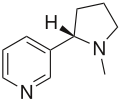Nicotinic acetylcholine receptor
Nicotinic acetylcholine receptor (nAChR) is a type of protein that responds to the neurotransmitter acetylcholine. nAChRs are found in many tissues throughout the body, particularly in the nervous system, where they play key roles in synaptic transmission.
Structure[edit]
nAChRs are composed of five subunits, arranged symmetrically around a central pore. Each subunit is made up of an extracellular domain, a transmembrane domain, and an intracellular domain. The extracellular domain contains the acetylcholine binding site, while the transmembrane domain forms the ion channel.
Function[edit]
nAChRs are ionotropic receptors, meaning they act as ion channels. When acetylcholine binds to the receptor, it causes the channel to open, allowing ions to flow across the cell membrane. This can trigger a variety of responses, depending on the type of cell and the specific ions involved.
In the nervous system, nAChRs are involved in transmitting signals between neurons. They are also found in muscle cells, where they play a crucial role in muscle contraction.
Clinical significance[edit]
nAChRs are the target of several drugs and toxins. For example, nicotine from tobacco binds to nAChRs, leading to the release of dopamine and other neurotransmitters. This is thought to be a major factor in the addictive properties of tobacco.
nAChRs are also implicated in a number of diseases, including Alzheimer's disease, Parkinson's disease, and myasthenia gravis. Research is ongoing to develop new drugs that can modulate the activity of nAChRs for therapeutic benefit.
See also[edit]

This article is a neuroscience stub. You can help WikiMD by expanding it!
-
Structure of acetylcholine
-
Structure of nicotine
-
Nicotinic acetylcholine receptor
Ad. Transform your life with W8MD's Budget GLP-1 injections from $49.99


W8MD offers a medical weight loss program to lose weight in Philadelphia. Our physician-supervised medical weight loss provides:
- Weight loss injections in NYC (generic and brand names):
- Zepbound / Mounjaro, Wegovy / Ozempic, Saxenda
- Most insurances accepted or discounted self-pay rates. We will obtain insurance prior authorizations if needed.
- Generic GLP1 weight loss injections from $49.99 for the starting dose of Semaglutide and $65.00 for Tirzepatide.
- Also offer prescription weight loss medications including Phentermine, Qsymia, Diethylpropion, Contrave etc.
NYC weight loss doctor appointmentsNYC weight loss doctor appointments
Start your NYC weight loss journey today at our NYC medical weight loss and Philadelphia medical weight loss clinics.
- Call 718-946-5500 to lose weight in NYC or for medical weight loss in Philadelphia 215-676-2334.
- Tags:NYC medical weight loss, Philadelphia lose weight Zepbound NYC, Budget GLP1 weight loss injections, Wegovy Philadelphia, Wegovy NYC, Philadelphia medical weight loss, Brookly weight loss and Wegovy NYC
|
WikiMD's Wellness Encyclopedia |
| Let Food Be Thy Medicine Medicine Thy Food - Hippocrates |
Medical Disclaimer: WikiMD is not a substitute for professional medical advice. The information on WikiMD is provided as an information resource only, may be incorrect, outdated or misleading, and is not to be used or relied on for any diagnostic or treatment purposes. Please consult your health care provider before making any healthcare decisions or for guidance about a specific medical condition. WikiMD expressly disclaims responsibility, and shall have no liability, for any damages, loss, injury, or liability whatsoever suffered as a result of your reliance on the information contained in this site. By visiting this site you agree to the foregoing terms and conditions, which may from time to time be changed or supplemented by WikiMD. If you do not agree to the foregoing terms and conditions, you should not enter or use this site. See full disclaimer.
Credits:Most images are courtesy of Wikimedia commons, and templates, categories Wikipedia, licensed under CC BY SA or similar.
Translate this page: - East Asian
中文,
日本,
한국어,
South Asian
हिन्दी,
தமிழ்,
తెలుగు,
Urdu,
ಕನ್ನಡ,
Southeast Asian
Indonesian,
Vietnamese,
Thai,
မြန်မာဘာသာ,
বাংলা
European
español,
Deutsch,
français,
Greek,
português do Brasil,
polski,
română,
русский,
Nederlands,
norsk,
svenska,
suomi,
Italian
Middle Eastern & African
عربى,
Turkish,
Persian,
Hebrew,
Afrikaans,
isiZulu,
Kiswahili,
Other
Bulgarian,
Hungarian,
Czech,
Swedish,
മലയാളം,
मराठी,
ਪੰਜਾਬੀ,
ગુજરાતી,
Portuguese,
Ukrainian


